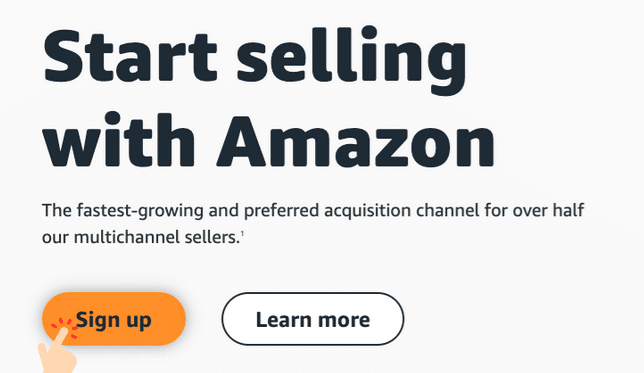It’s true. Becoming an Amazon reseller can be your ticket to financial freedom and entrepreneurial success. In this guide, we’ll provide you with a step-by-step roadmap to navigate the complexities of this vast marketplace.
Discover the secrets to finding profitable products that will fly off the virtual shelves. Learn how to set up your seller account, create compelling product listings, and optimize them for maximum visibility and sales.
Whether you’re aiming for a side income or dreaming of launching a thriving e-commerce empire, our guide equips you with the knowledge, strategies, and confidence to thrive as an Amazon reseller. Get ready to take your business to new heights in the dynamic world of Amazon reselling!
What is Amazon’s Reseller Program?

If you’re looking to start a business selling products online, becoming an Amazon reseller can be a great option. Amazon’s Reseller Program allows you to sell products on Amazon’s marketplace and take advantage of their vast customer base and resources.
Eligibility Criteria
To become an Amazon reseller, you must meet certain eligibility criteria. You must have a valid tax ID and bank account, and you must be able to provide product invoices and other documentation as needed. Additionally, you must agree to abide by Amazon’s policies and guidelines, including their pricing policies and customer service standards.
Program Benefits
Becoming an Amazon reseller comes with many benefits. You’ll have access to Amazon’s massive customer base, which can help you reach a wider audience and increase sales. Additionally, you’ll have access to Amazon’s resources, such as their shipping and fulfillment services, which can help streamline your business operations.
Types of Reseller Accounts
There are two types of reseller accounts available through Amazon’s Reseller Program: Individual and Professional. Individual accounts are designed for those who plan to sell fewer than 40 items per month, while Professional accounts are for those who plan to sell more than 40 items per month. Professional accounts come with additional benefits, such as the ability to use Amazon’s API and access to bulk listing and reporting tools.
Setting Up Your Reseller Account

Registration Process
To become an Amazon reseller, the first step is to create a seller account. You can do this by visiting the Amazon Seller Central website and clicking on the “Register Now” button. You will be prompted to provide some basic information such as your name, email address, and business name. Once you have completed the registration process, you will need to verify your identity by providing additional information such as your address and phone number.
Choosing Your Niche
Before you start selling on Amazon, it’s important to choose a niche that you are knowledgeable about and passionate about. This will help you to create product listings that are accurate and informative. Take some time to research different niches and identify the ones that are most popular among Amazon shoppers. This will give you a good idea of what products are in demand and what you should focus on selling.
Creating Product Listings
Once you have chosen your niche, it’s time to start creating product listings. Your product listings should be clear, concise, and informative. They should include all relevant information such as product features, dimensions, and shipping information. You can use formatting such as bullet points and bold text to make your listings more visually appealing and easier to read.
Sourcing Products to Sell

As an Amazon reseller, sourcing products to sell is a crucial step in building a successful business. In this section, we’ll cover two important aspects of sourcing products: finding reliable suppliers and evaluating product demand.
Finding Reliable Suppliers
To find reliable suppliers, you can start by conducting online research and reaching out to manufacturers directly. You can also attend trade shows or connect with other resellers to get recommendations.
Once you have a list of potential suppliers, it’s important to evaluate their reliability. Look for suppliers who have a good reputation, offer competitive pricing, and have a track record of delivering products on time and in good condition.
To ensure that you are working with a reliable supplier, you can also ask for references and check their reviews on Amazon and other online marketplaces.
Evaluating Product Demand
Before you start sourcing products, it’s important to evaluate the demand for your chosen products. You can use Amazon’s Best Sellers Rank and other online tools to determine the popularity of a product.
Additionally, you can conduct keyword research to see how many people are searching for your chosen product. This will give you an idea of how many potential customers are interested in your product.
Optimizing Sales and Marketing

As an Amazon reseller, your ultimate goal is to increase sales and profits. There are several strategies you can use to optimize your sales and marketing efforts.
Pricing Strategies
Pricing is a critical factor that determines the success of your Amazon business. You need to set a competitive price that attracts customers and generates profits. You can use several pricing strategies, such as:
- Competitive pricing: Set your prices lower than your competitors to attract customers. However, make sure that you still make a profit.
- Dynamic pricing: Adjust your prices based on market demand, competition, and other factors. You can use Amazon’s pricing tools to automate this process.
- Bundling: Offer multiple products at a discounted price to encourage customers to buy more.
- Seasonal pricing: Adjust your prices based on seasonal demand. For example, you can offer discounts during the holiday season.
Advertising on Amazon
Amazon offers several advertising options that can help you reach more customers and increase sales. Some of the advertising options include:
- Sponsored Products: Promote your products on Amazon search results and product detail pages.
- Sponsored Brands: Promote your brand and products on Amazon search results and product detail pages.
- Sponsored Display: Reach customers who are browsing and shopping on Amazon and other websites.
You can use Amazon’s advertising tools to create and manage your ads. Make sure that you target the right keywords and audience to maximize your ROI.
Customer Engagement and Feedback

Engaging with your customers and collecting feedback is crucial to improve your products and services. You can use several strategies to engage with your customers, such as:
- Responding to customer reviews: Respond to both positive and negative reviews to show that you care about your customers’ feedback.
- Offering promotions and discounts: Offer exclusive promotions and discounts to your loyal customers to encourage them to buy more.
- Providing excellent customer service: Make sure that you provide timely and helpful responses to your customers’ inquiries and concerns.
You can also use customer feedback to improve your products and services. Analyze customer feedback to identify areas for improvement and make necessary changes.
Managing Your Amazon Business

Handling Orders and Fulfillment
As an Amazon reseller, managing your orders and fulfillment is crucial to the success of your business. Amazon provides various tools to help you manage your orders, including the Order Details page, which allows you to view and manage your orders, track shipments, and communicate with customers.
To ensure timely and accurate order fulfillment, you need to keep your inventory up-to-date and use Amazon’s Fulfillment by Amazon (FBA) service. FBA allows you to store your products in Amazon’s fulfillment centers, and Amazon takes care of the shipping, handling, and customer service for you.
Dealing with Returns and Refunds
Returns and refunds are an inevitable part of any business, and it is important to have a clear and fair policy in place. Amazon has its own return policy, which allows customers to return items within 30 days for a full refund. As a seller, you can choose to offer additional return options, such as extended return periods or restocking fees.
To handle returns and refunds efficiently, you need to have a system in place for receiving and processing returns, inspecting returned items, and issuing refunds. You can use Amazon’s Return Reports to track your returns and refunds and to identify any patterns or issues that may need to be addressed.
Monitoring Performance Metrics
Monitoring your performance metrics is essential to understanding how your business is performing on Amazon. Amazon provides various metrics to help you track your performance, including Order Defect Rate (ODR), Late Shipment Rate (LSR), and Valid Tracking Rate (VTR).
To improve your performance metrics, you need to provide accurate product descriptions, ship orders on time, and respond promptly to customer inquiries and feedback. You can also use Amazon’s Performance Notifications to stay up-to-date on any issues or concerns that may affect your metrics.
Conclusion
Remember, success as an Amazon reseller requires continuous adaptation and optimization. Stay informed about market trends, leverage data-driven insights, and never stop learning. By constantly refining your product selection, optimizing your listings, and providing exceptional customer service, you’ll position yourself for long-term success on this thriving platform.
Now it’s time to take action. Put your newfound knowledge into practice, embrace the challenges, and seize the opportunities that lie ahead. Whether you’re starting small or aiming high, the potential for growth and profitability as an Amazon reseller is within your reach.
We wish you the best of luck on your reselling journey. Embrace the excitement, persevere through obstacles, and watch your Amazon reselling venture flourish. Remember, you have the power to make your entrepreneurial dreams a reality.
To support you further on this venture, we’ve prepared another article that could be your guide in leveraging one of the world’s top wholesale suppliers for e-Commerce. Check out How to Sell on Amazon from Alibaba here.
Frequently Asked Questions
How much can you make as a reseller on Amazon?
The amount of money you can make as an Amazon reseller depends on various factors, including the type of products you sell, your profit margins, and your level of competition. Some resellers make a few hundred dollars a month, while others can earn a full-time income. It’s important to research the market and understand your costs to determine your potential earnings.
Can I buy products and resell them on Amazon?
Yes, you can buy products from various sources, such as wholesalers, liquidators, or clearance sales, and resell them on Amazon. However, you need to make sure that the products you sell meet Amazon’s guidelines and policies, such as being new, authentic, and in good condition.
Is it worth it to be an Amazon reseller?
Becoming an Amazon reseller can be a profitable business, but it also requires time, effort, and investment. It’s important to research the market and competition, understand the costs and risks involved, and develop a solid business plan before starting. If done correctly, being an Amazon reseller can be a rewarding and lucrative venture.
Where to buy items to resell on Amazon?
There are various sources to buy items to resell on Amazon, such as wholesalers, distributors, liquidators, or clearance sales. You can also consider sourcing products from overseas manufacturers or private label products. It’s important to research and compare prices, quality, and shipping costs to ensure profitability.
Can I resell name brand items on Amazon?
You can resell name brand items on Amazon, but you need to make sure that they are authentic and meet Amazon’s guidelines and policies. Some brands may have restrictions or require approval before selling on Amazon, so you need to research and comply with their rules.
Is it legal to buy and resell items online?
Buying and reselling items online is legal. However, you must comply with the laws and regulations regarding taxes, licenses, and permits. You should research and understand the legal requirements in your area. Then, make sure to comply with them to avoid any legal issues.
